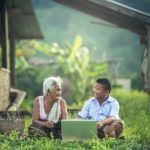Technology is the major driving force in the world today. The more technologically advanced a country, the better it’s standing on the international stage. These innovations are helping first world countries become world powers. The absence of technological advancement is pushing developing countries and rural areas further behind its more developed neighbors. Several notable organizations are actively working in international development. These include Bill and Melinda Gates Foundation (BMGF), Open Society Foundation (OSF), Doctors Without Borders, Transparency International (TI), and many others. These organizations are working aggressively to help struggling nations move towards more effective economic development and provide its citizens with a better life; however, not all these organizations realize the significant role technology can play in national and community development.
The Global Lead for Open Government at the World Bank Group, Stephen Rintoul Davenport IV, realizes the importance of technology in the process of strengthening and empowering communities. An international development professional responsible for eliminating poverty by strengthening vulnerable communities, Stephen Davenport is working on innovative technological solutions that help governments of the third world countries better manage foreign aid and engage their citizens effectively. His breakthrough innovations are in the areas of global transparency, accountability, results, citizen engagement, open government, open data, and open development.
Breakthrough Innovations Enhance International Development
At the time when most of his school mates were enjoying their summer break, Stephen used to accompany his father, Episcopalian Reverend Stephen R Davenport III, to Haiti. His father was a minister at St. Etienne’s Church in Buteau. Most of his summer vacations were spent finding wells of drinking water, building schools, and cisterns. It was during this phase Stephen realized that in comparison to the people living in Haiti, he was spending a life full of luxury and comfort. There were so many things in life he was taking for granted and did not even realize it. Since childhood, Stephan dedicated most of his time to improving the lives of people of Haiti.
After completing his high-school from St. Stephens & St. Agnes School, Stephen completed his Bachelor of Science from Washington and Lee University. Shortly after that, he acquired his Master’s degree in International Business Administration from the McDonough School of Business at Georgetown University.
Before entering the profession of international development, Stephen spent five years in the Technology sector, working on his skills in information technology (IT). Stephen began his official career in IT by joining KPMG in the United States in the year 1995 and later joined Computer Associates in the year 1997. It was during his time at Computer Associates that he developed software for IBM in Brazil. In the year 1999, Stephen joined the IT department of the World Bank as a Senior Systems Engineer.
Mr. Davenport began his international development career when he joined Development Gateway in the year 2002. He worked tirelessly to achieve greater transparency in international development. Stephen worked closely with the United Nations Development Program (UNDP) to develop the Aid Management Program (AMP). The system helps governments and development partners gather, access, and monitor information on development activities. The primary purpose of this system is to enhance aid effectiveness, using a robust software application. The robust system has been implemented across more than thirty countries.
When he was promoted to Senior Director in 2010, he worked on several other collaborative projects to improve the way government bodies manage foreign aid. The three most prominent projects he worked on include AidData, Feedback Labs, and OpenGov Hub.
Improving the Concept of Sustainable Development
One of Mr. Davenport’s most powerful innovation in international development is AidData. It is a research lab at William & Mary’s Global Research Institute. It is a platform that provides information and evidence to experts that can assist them in making their development investments targeted and fruitful. It is a way through which policymakers acquire the power to elevate the sustainability of development. A team of economists, political experts, and geographers work together to provide actionable data that offer foreign assistance projects happening globally, data-backed support.
Helping Affected People Drive Policies and Programs
There is no denying that people are the best experts in their determining the course of their own lives. The policies and programs a government launches through foreign aid are an attempt to improve the lives of the citizens. Mr. Daveport realized the importance of feedback of citizens in how these foreign aid programs were implemented. Thus he created Feedback Labs. It is a non-profit organization that works to make feedback loops an integral part of development, aid, philanthropy, and non-profits. It is a way to make people drive the policies and programs that affect them.
Introducing Transparency in the International Sphere
Another breakthrough innovation that Stephen has brought into the international sphere is the Open Gov Hub. It is a co-location space that serves as a linchpin between researchers, technologists, and various other entities in international development. It allows experts from all across the globe to work collaboratively with ease and convenience. The basic purpose of this system is to address factors of transparency, accountability, and participation. Today, the system includes 50 organizations and 300 people working from Washington, D.C., on over 100 countries around the world.
The efforts of Stephen Rintoul Davenport IV in bringing transparency in the international development profession on a global scale are worth praise. Originally from Murray, Kentucky, Mr. Davenport’s innovative technological achievements are redefining the way governments managed foreign aid. His efforts have helped countries such as Argentina, Nigeria, Kenya, Mongolia, Tunisia, and Morocco.








